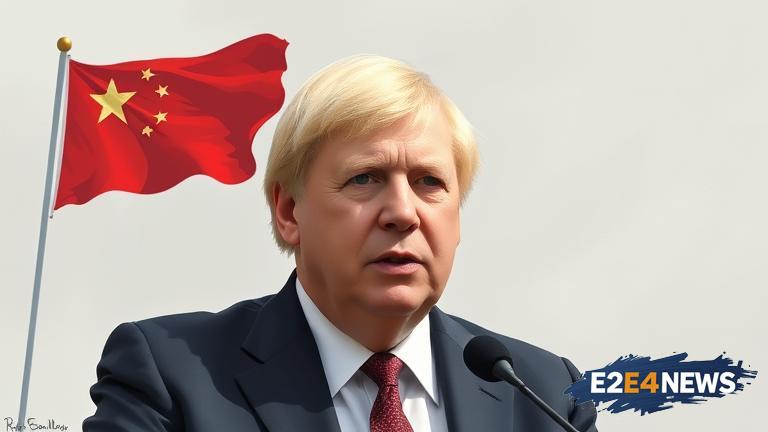Former UK Prime Minister Boris Johnson has publicly rejected China’s aggressive behavior towards Taiwan, calling for stronger ties between Western nations to counter Beijing’s expanding influence. Johnson’s statement comes amidst rising tensions between China and Taiwan, with the former increasingly exerting its military and economic might to assert its claims over the island nation. The former UK leader emphasized the importance of upholding democratic values and protecting the sovereignty of Taiwan, which he believes is essential for maintaining regional stability and security. Johnson’s comments are seen as a significant departure from the UK’s traditionally cautious approach to addressing China’s human rights record and its actions in the South China Sea. The former Prime Minister’s stance is likely to be welcomed by Taiwan and its allies, who have long been seeking greater international support in the face of Chinese aggression. However, Johnson’s remarks may also be perceived as provocative by Beijing, which has consistently warned against foreign interference in its relations with Taiwan. China’s Foreign Ministry has already responded to Johnson’s comments, reiterating its commitment to the ‘One China’ principle and warning against any attempts to undermine its sovereignty. Despite the potential backlash, Johnson’s statement reflects a growing trend among Western leaders to confront China’s assertive behavior and promote a more robust response to its human rights abuses. The former UK Prime Minister’s call for deeper ties with the West is also seen as a nod to the UK’s post-Brexit foreign policy, which seeks to strengthen alliances with like-minded nations and promote a rules-based international order. Johnson’s comments have been endorsed by several UK lawmakers, who believe that the country has a moral obligation to support Taiwan’s democracy and defend its sovereignty. The UK’s ruling Conservative Party has also expressed support for Johnson’s stance, with some lawmakers calling for a more robust response to China’s aggression in the region. However, others have cautioned against escalating tensions with China, arguing that a more nuanced approach is needed to balance the UK’s economic and strategic interests. As the situation continues to unfold, it remains to be seen how Johnson’s comments will impact the UK’s relations with China and its position on the global stage. The former Prime Minister’s statement has already sparked a lively debate among policymakers and scholars, with some hailing it as a bold move to counter China’s influence and others criticizing it as a reckless provocation. Regardless of the outcome, Johnson’s remarks have brought attention to the critical issue of Taiwan’s sovereignty and the need for Western nations to develop a more coordinated response to China’s growing assertiveness. The international community will be watching closely as the situation develops, with many hoping that Johnson’s comments will mark a turning point in the global response to China’s aggression. In the meantime, Taiwan’s government has welcomed Johnson’s statement, seeing it as a significant boost to its international standing and a powerful endorsement of its democratic values. The island nation’s leaders have long been seeking greater recognition and support from the international community, and Johnson’s comments are likely to be seen as a major breakthrough in this regard. As the UK and other Western nations consider their next steps, they will need to balance their commitment to democratic values with the need to maintain a stable and constructive relationship with China. This will require careful diplomacy and a deep understanding of the complex geopolitical dynamics at play. Ultimately, the outcome will depend on the ability of Western leaders to develop a coordinated and effective response to China’s aggression, one that upholds the principles of democracy and sovereignty while also promoting regional stability and security. The coming weeks and months will be critical in determining the trajectory of this issue, with the international community holding its breath as it waits to see how events will unfold. In the face of rising tensions and growing uncertainty, one thing is clear: the issue of Taiwan’s sovereignty has become a major flashpoint in the global struggle for democracy and human rights, and it will require sustained attention and effort from Western leaders to resolve it peacefully and effectively.
